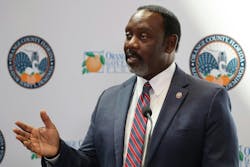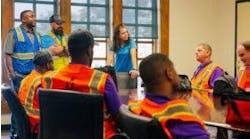A week after abandoning his 2024 effort, Orange County Mayor Jerry Demings said Tuesday a proposal to hike the sales tax to pay for transportation needs is almost certain to return in 2026.
The county estimates it will take at least $21 billion over the next decade to untangle road congestion, improve bicycle and pedestrian safety, and expand and improve existing mass transit options, Lynx and SunRail.
Those needs can’t be met without a dedicated funding source, Demings said Tuesday, describing a restricted-use sales-tax increase as “probably the best long-term prospect” for generating revenue.
“The reason why…is because a majority of that tax will be paid for by visitors,” he said.
Demings cited a state analysis that had estimated tourists would pay “somewhere north of 50%” of any sales-tax increase imposed on most goods and services, excluding food, medicine and other non-taxable items.
Orange County commissioners unanimously agreed with the mayor April 8 to halt a discussion to put a transportation sales-tax referendum on the 2024 November ballot, after the proposal failed to gain traction during weeks of community meetings.
Orange County abandons proposed transportation sales tax
State law requires any proposal to enact a discretionary sales surtax must be approved in a referendum held at a general election, which, after Nov. 5, won’t be staged in Orange County until Nov. 2026.
A 2022 transportation tax referendum was walloped by voters, 58% of whom said no.
In recent weeks, Demings had struggled to make a case to skeptical commissioners that the vote would turn out differently this time.
“There’s no good time to tell people you have to pay more taxes,” Demings said. “But at some point, our community will have the tolerance to say, ‘Hey, we’re going to have to pony up some additional dollars in order to have the kind of desired results that we are looking for.’ ”
“If you want to be a major metropolitan community, a world-class community, this is something we have to do,” the mayor said of raising revenue. “World-class communities have a mass transit system within their reach…We must see the wisdom of doing it as a community.”
Demings had originally proposed a 1% hike for 20 years, which would have raised an estimated $759 million annually.
With that level of increase off the table for now, the mayor used Tuesday’s press gathering to pitch the county’s “accelerated transportation safety program,” a five-year, $100-million effort also known as ATS and aimed at funding smaller projects that improve pedestrian safety.
About $55 million will be spent on sidewalks, improved lighting and other safety measures.
About $30 million will be spent improving the frequency and connectivity of the Lynx bus service on routes that run to job centers like the International Drive corridor, and another $15 million will go to upgraded bus stops and shelters.
Demings was joined at the briefing Tuesday by commissioner Christine Moore, She said she was pleased Tuesday to see crews installing lighting along Votaw Road in Apopka, part of her northwest district.
With a limited budget, big road projects and public transit upgrades will be difficult to fund.
But cheaper projects like adding sidewalks or street lighting will help keep people safe, she said.
Demings encouraged residents to speak up about what they want, urging them to complete an online transportation survey available on the county’s website, ocfl.net/traffictransportation. He said the results will help shape the county’s action plan for transportation options amid a population surge.
The mayor warned the county will remain “car-centric” without funding for multimodal options, a refrain he has repeated often at community meetings since he first suggested a sales tax for transportation.
“In the 300-plus times that I’ve been out in this community to talk about these issues, not one time has any particular group said that traffic congestion wasn’t a problem,” he said. “Not once.”
©2024 Orlando Sentinel. Visit orlandosentinel.com. Distributed by Tribune Content Agency, LLC.



